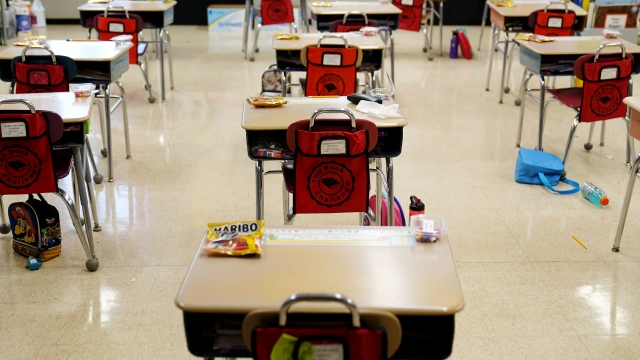When your child is sick, they stay home from school. However, when they feel anxious or depressed, some students are told to tough it out.
Twelve states have passed laws that take a different approach: Allowing kids to take a mental health day, without consequence, to tend to their mental well-being.
Since the pandemic, mental health has been a top concern in schools across the country as the CDC reports 44% of students say they feel persistently sad or hopeless.
To help combat it, more states are passing mental health legislation so kids can call out of school without consequence to focus on their mental well-being, but experts say it is too soon to say whether the days are actually working or not.
"This is so new that there's not really a lot of data around it," said Kelly Vaillancourt, the director of policy and advocacy at the National Association of School Psychologists.
SEE MORE: White House takes new steps for kids' mental health and online safety
Vaillancourt says what we are seeing in terms of mental health days is good theory, but unknown in practice. Kentucky was the most recent state to pass legislation in April 2022 that allows students to mark mental health days as an excused absence. The legislation does not change the number of excused absences students get per year.
Other states, like Illinois, allow students to take up to five days a year to care for their mental health.
"The intent of this and the idea behind it is laudable because we don't bat an eye [when we say] my son is home today because he has a bad cough," said Vaillancourt. "No one thinks twice. Why shouldn't we also be allowing kids to take the time they need if they're feeling mentally unwell?"
More students are missing school than ever before, according to statewide data compiled by Scripps News, and Vaillancourt says at least a part of that can be attributed to the increase in mental health concerns among students.
Reviewing attendance records from several states, Scripps News found that chronic absenteeism — in which students miss more than 18 days a year — rose significantly in every state surveyed.
In Colorado, chronic absenteeism jumped from 22.5% in the 2018-19 school year to 35.5% in the 2021-22 school year. In Michigan, it rose from 20%-38%. In Ohio, chronic absenteeism rose from 16.7%-30.2%, and in Illinois, it rose from 17.5% in 2018-19 to 29.8% in 2021-22.
SEE MORE: Data shows how smartphone use at young age impacts mental well-being
Vaillancourt says mental health days could help cut down on the number of unexcused absences if it is paired with other strategies on how to deal with uncomfortable emotions.
"If we're just saying you can take a day off school because you're feeling depressed today or you're feeling anxious, are we actually helping that child learn appropriate strategies?" said Vaillancourt. "Moving forward in life, you can't just call out of work sick every day you don't feel good. At some point we have to make sure that allowing kids to take a day off to tend to their own needs is coupled with additional resources to help kids develop those strategies."
Scripps News asked several school districts if they track how many students take these mental health days, and they either said no or did not respond, so there is still more work to be done in understanding their true impact on students.
A survey from Verywell Mind said 77% of parents support mental health days.
Dr. Vaillancourt says passing this legislation helps erode the stigma around talking about mental health in schools.
Trending stories at Scrippsnews.com




